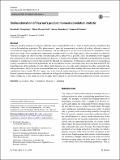Underestimation of Pearson's product moment correlation statistic
Date
01/2019Metadata
Show full item recordAbstract
Pearson’s product moment correlation coefficient (more commonly Pearson’s r) tends to underestimate correlations that exist in the underlying population. This phenomenon is generally unappreciated in studies of ecology, although a range of corrections are suggested in the statistical literature. The use of Pearson’s r as the classical measure for correlation is widespread in ecology, where manipulative experiments are impractical across the large spatial scales concerned; it is therefore vital that ecologists are able to use this correlation measure as effectively as possible. Here, our literature review suggests that corrections for the issue of underestimation in Pearson’s r should not be adopted if either the data deviate from bivariate normality or sample size is greater than around 30. Through our simulations, we then aim to offer advice to researchers in ecology on situations where both distributions can be described as normal, but sample sizes are lower than around 30. We found that none of the methods currently offered in the literature to correct the underestimation bias offer consistently reliable performance, and so we do not recommend that they be implemented when making inferences about the behaviour of a population from a sample. We also suggest that, when considering the importance of the bias towards underestimation in Pearson’s product moment correlation coefficient for biological conclusions, the likely extent of the bias should be discussed. Unless sample size is very small, the issue of sample bias is unlikely to call for substantial modification of study conclusions.
Citation
Humphreys , R K , Puth , M-T , Neuhäuser , M & Ruxton , G D 2019 , ' Underestimation of Pearson's product moment correlation statistic ' , Oecologia , vol. 189 , no. 1 , pp. 1-7 . https://doi.org/10.1007/s00442-018-4233-0
Publication
Oecologia
Status
Peer reviewed
ISSN
0029-8549Type
Journal article
Collections
Items in the St Andrews Research Repository are protected by copyright, with all rights reserved, unless otherwise indicated.

